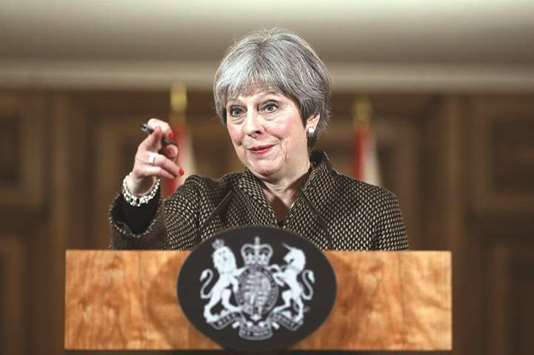On the eve of the royal wedding, Theresa May has nominated nine new Tory peers, including the former cabinet ministers Sir Eric Pickles and Peter Lilley, and handed one to Northern Ireland’s Democratic Unionist party as she tries to bolster her party’s fragile position in the House of Lords.
Four other former Tory MPs are to be elevated to a chamber which has defied May’s government on 15 occasions over Brexit, in an afternoon announcement that has prompted accusations that No 10 was trying to use Prince Harry and Meghan Markle’s wedding to bury the news.
The full list of Tories includes Sir Edward Garnier, Sir John Randall,
Sir Alan Haselhurst, and Andrew Tyrie, all former MPs.
May’s other nominees are Diana Barran, Catherine Meyer, the founder of Action Against Abduction who is married to former US ambassador Sir Christopher Meyer, and Amanda Sater, a former party deputy chair.
The nominations will tilt the balance of the chamber slightly in favour of May, taking her party’s total of peers from 244 to 253.
However, no party has a majority in the 780-strong upper house, and the government has been so heavily defeated on some amendments that introducing a handful of more supportive peers will only make a modest difference in getting Brexit through parliament.
The Democratic Unionist Party (DUP) will nominate the former MP William McCrea, who has been criticised for sharing a platform in the past with Billy Wright, a loyalist paramilitary.
Only McCrea’s name emerged, despite rumours that the DUP was initially offered at least one other nomination.
Labour was granted three nominations, and Jeremy Corbyn put forward the former party general secretary Iain McNicol and the race equality campaigner Martha Osamor, the mother of the MP Kate Osamor, as had been expected.
The third nominee is Pauline Bryan, a Scottish campaigner and editor of What Would Keir Hardie Say?, a collection of essays once given by Corbyn to Barack Obama.
The proposed elevation of Osamor was immediately criticised by a Jewish campaign group after it emerged that she was one of several signatories to a 2016 letter complaining about the suspension of Ken Livingstone and others over anti-Semitism.
Arguing that the suspensions were McCarthyite, the letter said the charges of anti-Semitism were being used to “silence criticisms of Israel … and undermine Labour leader Jeremy Corbyn”.
Gideon Falter, the chair of the Campaign Against Anti-Semitism, said that elevating Osamor was a “two-fingered salute” to the Jewish community, and that Corbyn’s decision was “telling us not only that he sees her behaviour as unproblematic, but that he sees it as being worthy of the highest honour and a lifelong seat in the House of Lords”.
Political peers are nominated periodically at the initiation of Downing Street in a behind-the-scenes haggling process, which in this case began in November, and starts with a debate about how many each party is granted.
Names are suggested informally and canvassed before the House of Lords appointments commission to see if they meet the appropriate financial and legal standards before finally being formally submitted.
The Liberal Democrats did not make any nominations, although it is well represented in the chamber with 98 peers.
Dick Newby, the party’s leader in the Lords, said: “This is a cynical response from Theresa May to losing a string of votes in the Lords in recent weeks.”
Pickles, who was party chair under David Cameron and local government secretary during the coalition, is close to the prime minister.
At his final PMQs (Prime Minister’s Questions) before the 2017 election when he stood down, May called him “my chum”.
During his tenure as a minister, local councils’ budgets were slashed by 20%.
Lilley, a Thatcherite who has long been a Eurosceptic, was Margaret Thatcher’s trade secretary and then social security secretary in John Major’s government.
At the 1992 party conference he sang about his “little list” of benefit fraudsters and was an energetic promoter of the idea that many people on social security were scroungers.

The nominations will tilt the balance of the chamber slightly in May’s favour.
